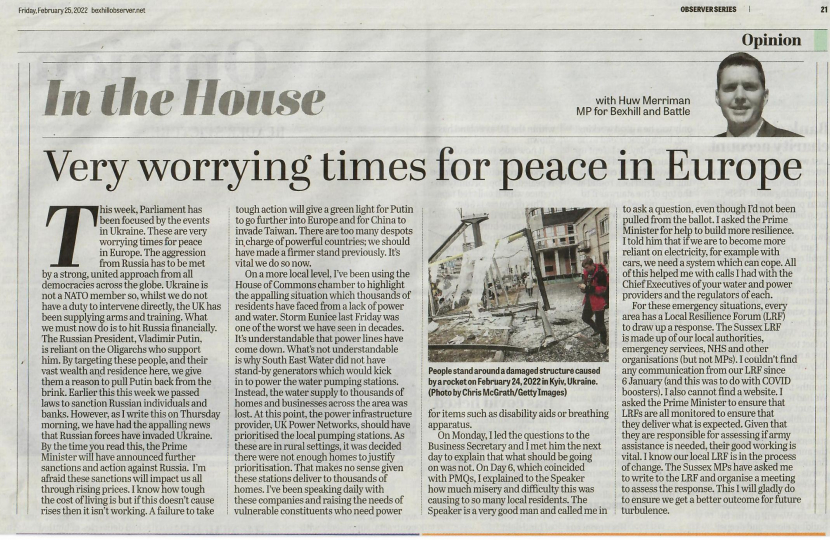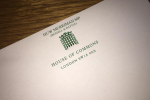
This week, Parliament has been focused on the events in Ukraine. These are very worrying times for peace in Europe. The aggression from Russia has to be met by a strong, united approach from all democracies across the globe. Ukraine is not a NATO member so, whilst we do not have a duty to intervene directly, the UK has been supplying arms and training. What we must now do is to hit Russia financially. The Russian President, Vladimir Putin, is reliant on the Oligarchs who support him. By targeting these people, and their vast wealth and residence here, we give them a reason to pull Putin back from the brink. Earlier this this week we passed laws to sanction Russian individuals and banks. However, as I write this on Thursday morning, we have had the appalling news that Russian forces have invaded Ukraine. By the time you read this, the Prime Minister will have announced further sanctions and action against Russia. I’m afraid these sanctions will impact us all through rising prices. I know how tough the cost of living is but if this doesn’t cause rises then it isn’t working. A failure to take tough action will give a green light for Putin to go further into Europe and for China to invade Taiwan. There are too many despots in charge of powerful countries; we should have made a firmer stand previously. It’s vital we do so now.
On a more local level, I’ve been using the House of Commons chamber to highlight the appalling situation which thousands of residents have faced from a lack of power and water. Storm Eunice last Friday was one of the worst we have seen in decades. It’s understandable that power lines have come down. What’s not understandable is why South East Water did not have stand-by generators which would kick in to power the water pumping stations. Instead, the water supply to thousands of homes and businesses across the area was lost. At this point, the power infrastructure provider, UK Power Networks, should have prioritised the local pumping stations. As these are in rural settings, it was decided there were not enough homes to justify prioritisation. That makes no sense given these stations deliver to thousands of homes. I’ve been speaking daily with these companies and raising the needs of vulnerable constituents who need power for items such as disability aids or breathing apparatus.
On Monday, I led the questions to the Business Secretary and I met him the next day to explain that what should be going on was not. On Day 6, which coincided with PMQs, I explained to the Speaker how much misery and difficulty this was causing to so many local residents. The Speaker is a very good man and called me in to ask a question, even though I’d not been pulled from the ballot. I asked the Prime Minister for help to build more resilience. I told him that if we are to become more reliant on electricity, for example with cars, we need a system which can cope. All of this helped me with calls I had with the Chief Executives of your water and power providers and the regulators of each.
For these emergency situations, every area has a Local Resilience Forum (LRF) to draw up a response. The Sussex LRF is made up of our local authorities, emergency services, NHS and other organisations (but not MPs). I couldn’t find any communication from our LRF since 6 January (and this was to do with COVID boosters). I also cannot find a website. I asked the Prime Minister to ensure that LRFs are all monitored to ensure that they deliver what is expected. Given that they are responsible for assessing if army assistance is needed, their good working is vital. I know our local LRF is in the process of change. The Sussex MPs have asked me to write to the LRF and organise a meeting to assess the response. This I will gladly do to ensure we get a better outcome for future turbulence.



